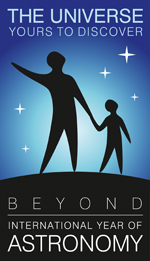IYA2009 Updates
22 May 2009
GalileoMobile
GalileoMobile is an itinerant science education project bringing IYA2009 to young underprivileged people across South America, to foster a will of learning by exciting wonder about our Universe, while supplying local teachers with educational resources to sustain our activities. GalileoMobile also extends its impact to a worldwide audience through the production of a documentary movie, conveying a message of interaction beyond borders and thus of "unity under the same sky", while raising awareness for the diversity of human cultures, and ultimately inspiring similar initiatives. More information is available on the GalileoMobile official website: http://www.galileo-mobile.org/
Angolan science minister urges institutions to work with astronomers on the occasion of IYA2009 Angolan minister of Science and Technology, Candida Teixeira, called on public and private institutions to cooperate and pay attention to the development of activities of the International Year of Astronomy 2009 due to its pedagogical interest and the re-launch of this science in the country. Learn more here: http://www.portalangop.co.ao/motix/en_us/noticias/ciencia-e-tecnologia/Science-minister-urges-institutions-work-with-astronomers,4e8160a2-58e1-4bf0-bf4d-94c84799d032.html
Dark Skies Awareness Updates
Dark Skies Awareness Podcast: Connie Walker and Rob Sparks from the National Optical Astronomy Observatory talk about the International Year of Astronomy 2009 Dark Skies Awareness Cornerstone Project on a 10-minute, audio podcast called "Back to the Dark Ages: Responsible Nighttime Lighting." The podcast can be downloaded free at http://365daysofastronomy.org/2009/05/16/may-16th-back-to-dark-ages-responsible-nighttime-lightingby/
The Earth and Sky Photo Contest: The photography contest is open to any amateur photographer of any age, anywhere in the world. The special theme of this contest is "Dark Skies Importance"; so the image should impress people about how important and amazing the starry sky is, how it affects our life, and how bad the problem of light pollution has become. Details on this programme can be found at www.darkskiesawareness.org
Dark Skies Discovery Sites: The Dark Skies Discovery Sites (DSDS) programme seeks to establish permanent relatively dark locations where the public can be educated about light pollution while being introduced to the wonders of a fairly dark night sky. Astronomy clubs or individuals can earn the official DSDS designation for their location by agreeing to present, mostly at their own pace and schedule, an ongoing series of programs about light pollution. Details can be found at www.darkskiesawareness.org
How Many Stars?: This is a star-hunting, citizen-science programme that encourages everyone - students, educators, astronomers and the general public to measure the darkness of their local night skies and contribute their observations online to a world map of light pollution. Find out more information at http://sternhell.at
Nights in the Parks: Throughout 2009, many national parks worldwide will be holding special programmes in celebration of the International Year of Astronomy 2009. Some of the last dark skies in the world may be found in national parks. See www.darkskiesawareness.org for more details or www.nps.gov for details within the United States.
We Are Astronomers Competition
To celebrate the launch of the amazing new full-dome digital planetarium show, "We Are Astronomers", you have the chance to win four free tickets to see the show at the nearest planetarium to you, along with an exclusive poster signed by the show's narrator, David Tennant. (Please note that this competition is only open to residents in the UK). So what do you have to do to win this excellent prize? It's quite simple; write us a twitter astronomy haiku! The winner will be announced on 01 June 2009, so get your thinking caps on! If you're intrigued and want to know more, visit: http://www.astronomy2009.org/news/updates/286/
Behind the scenes of "Around the World in 80 Telescopes"
Is it possible to visit all major observatories in the world, covering every continent, in the space of just 24 hours? ESO made a trip "Around the World in 80 Telescopes" during a live 24-hour webcast. Let's go behind the scenes to find out how it was done. Click to see the video! http://www.eso.org/gallery/v/Videos/esocast/ESOCAST7_P_FLASH.flv.html
Galileoscope update
The current production run of Galileoscopes consists of 60,000 units, which will satisfy orders placed and paid for through the first week of May. They will start leaving the factory on Monday 18 May, and will begin reaching customers in mid-June. Of these 60,000, about half are going to customers who bought small numbers of Galileoscopes via our website at https://www.galileoscope.org/gs/, and about half are going to others who placed large orders (100 or more kits) via our request-for-quotation system. Most of these orders are from schools and other educational organizations, with very few orders from SPoCs. If you want Galileoscopes at the current price, and if you want them in 2009, you need to order NOW! Thus, it is imperative that all SPoCs make contact with potential buyers of Galileoscopes within their respective jurisdictions and have orders committed as soon as possible. For the full update, visit http://www.astronomy2009.org/news/updates/285/.
Search IYA2009 Updates

National Nodes: 148
Organisational Nodes: 40
Organisational Associates:33
National Websites: 111
Cornerstone Projects: 12
Special Task Groups: 11
Special Projects:16
Official Products:8
Media Partners:22


